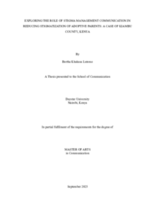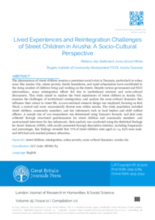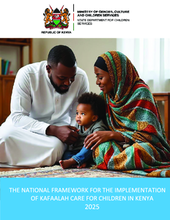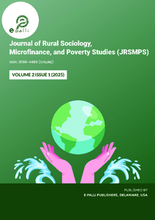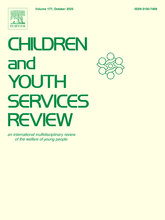Displaying 31 - 40 of 1617
This package of materials on Kafaalah - was developed by the Government of Kenya in collaboration with Changing the Way We Care, UNICEF, and other key development partners and civil society actors.
This study explores how stigma management communication can reduce the stigmatization of adoptive parents in Kiambu County, Kenya, where cultural beliefs often privilege biological lineage over adoption. Findings reveal that adoptive parents use strategies such as concealment, disclosure, reframing, and advocacy to challenge stigma and gradually normalize adoption, highlighting the vital role of communication in transforming societal attitudes and promoting acceptance.
This study examines the experiences of street children in Arusha City, Tanzania, highlighting the challenges they face due to poverty, family breakdown, and rapid urbanization. Findings show that most street children are boys aged 10–14 with only primary education, and reintegration efforts often fail because of institutional mistrust and socio-cultural barriers.
The Government of Kenya’s National Framework for the Implementation of Kafaalah Care provides structured guidance for practitioners, aiming to promote childcare to family-based settings. It outlines roles, coordination mechanisms, and monitoring strategies to ensure safe, standardized care for vulnerable children, and is intended for use by both state and non-state child protection practitioners.
This article describes how the government of Tanzania has launched a national initiative aimed at supporting children who live and work on the streets, with initial roll‑out in Dar es Salaam, Dodoma and Mwanza focusing on education, vocational tra
This news article, from the Guardian Tanzania, notes how the government of Tanzania has initiated a nationwide programme to support children living and working on the streets, marking a significant step towards protecting vulnerable groups and fostering inclusive development.
This study examines the challenges African governments face in integrating orphaned and vulnerable children into orphanages and home-based care facilities, with a focus on Zambia. Findings reveal major barriers including insufficient funding, unregistered orphanages, poor coordination with NGOs, cultural factors, and the attitudes of the children themselves.
In this article, UNICEF discusses how UNICEF and the Government of Mozambique are advancing reforms to reduce the number of children placed in institutions—from 7,269 in 2020 to 3,624 in 2024—by prioritizing family-based care.
This special issue of the Children and Youth Services Review concerns the governance of children's care systems in low and middle-income countries, with a focus on Cambodia, Uganda and Zambia. The special issue focuses on the political and bureaucratic factors that shape priority for and the effectiveness of national children's care systems in low and middle-income countries.
This case study showcases Kar Geno’s transition from institutional care to community-based support for children with disabilities in Siaya County, Kenya, guided by CTWWC and Catholic Relief Services. Through family reintegration, disability-inclusive services, and strong collaboration with government and civil society, Kar Geno has become a model for sustainable care reform, reintegrating nearly all resident children while continuing to provide accessible medical and psychosocial support through a community drop-in center.

